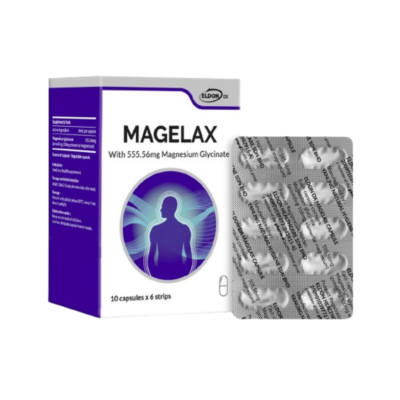This health article has been professionally reviewed by RPh Chong Kai Qian (020209), a registered pharmacist under the Malaysia Pharmacy Board (LFM).
Magnesium glycinate, also referred to as magnesium bisglycinate, is a form of magnesium that is bonded to the amino acid glycine through a process known as chelation. Chelation involves binding a mineral (magnesium) to an organic molecule, often an amino acid, to form a stable and easily absorbed compound (1).

Magnesium itself is generally known to promote relaxation, calmness, and support nerve & muscle function. Among its various form, magnesium glycinate stands out as a superior form of magnesium for brain and neurological health. This is largely attributed to glycine, the amino acid bound to magnesium in this compound. Glycine not only serves as a building block for proteins but also functions as an important neurotransmitter in the central nervous system. Glycine can cross the blood-brain barrier through specific transport mechanisms, allowing it to directly influence brain chemistry (2). Because of these properties, glycine- and by extension, magnesium glycinate has potential benefits in managing conditions such as migraine headaches, insomnia, dementia, Parkinson’s disease, and restless leg syndrome.
Additionally, this chelated structure offers several key advantages:
1. Enhanced absorption (3,4) – Magnesium glycinate,a chelated form of magnesium is typically absorbed more effectively in the digestive tract than non-chelated forms, increasing its overall bioavailability. It has been shown to have superior absorption compared to other common forms such as magnesium oxide, citrate, and as well as another chelated type, magnesium malate.
2. Gentle on digestion (5,6) – Unlike some other forms, magnesium glycinate is less likely to cause gastrointestinal discomfort such as diarrhea or cramping. Therefore, it is a suitable option for individuals who have previously experienced diarrhea from magnesium-rich foods or supplements, or those with sensitive stomach.
3. Promotes mental clarity and cognitive health – Glycine is a neurotransmitter—a type of chemical messenger that regulate communication between brain cells. This communication plays a key role inhow we think, feel, sleep, and handle stress.
When neurotransmitters levels are balanced, they contribute to mental clarity, emotional stability, and a sense of calm. Glycine and magnesium work synergistically to enhance calming effects and support overall neurological function. This combination may provide added therapeutic benefits beyond magnesium alone, making magnesium glycinate a valuable option to promote overall brain and nervous system health.
Efficacy Begins with the Right Mineral Source
While magnesium glycinate offers notable benefits, it is important to recognize that not all mineral supplements are created equal. The effectiveness of a chelated mineral depends not only on its chemical form but also on the quality and authenticity of the chelation process. That’s why choosing a reputable source is crucial.

Albion® Minerals (7), a brand from USA, is a well-established leader in chelated mineral science, known for transforming the ordinary minerals into highly bioavailable forms. With over 160 scientific publications supporting their chelated and specialty minerals, their formulations are backed by more than just marketing claims. Albion’s magnesium glycinate undergoes rigorous verification through their patented TRAACS™ (The Real Amino Acid Chelate System) testing method. This process ensures that true chelation has occurred—confirming that magnesium is properly bound to glycine for optimal absorption and efficacy.
Some magnesium supplements may be manufactured locally in Malaysia; however, it’s equally important to consider where the raw ingredients are sourced. The quality and origin of raw materials can significantly impact the supplement’s effectiveness, especially for advanced forms like chelated magnesium.
Reference:
- Mattar, G., Haddarah, A., Haddad, J., Pujola, M., & Sepulcre, F. (2022). New approaches, bioavailability and the use of chelates as a promising method for food fortification. Food chemistry, 373(Pt A), 131394. https://doi.org/10.1016/j.foodchem.2021.131394
- Tachikawa, M., & Hosoya, K. (2011). Transport characteristics of guanidino compounds at the bloodbrain barrier and blood-cerebrospinal fluid barrier: Relevance to neural disorders. Fluids and Barriers of the CNS, 8, 13. https://doi.org/10.1186/2045-8118-8-13
- Morgan, S., et al. (2015). Balchem internal data. Balchem Corporation.
- Hartle, J. W., et al. (2016, April). The FASEB Journal, 30(1 Suppl), 128.6.
- Moher, M. (2018). Diabetes Mellitus. Integrative Medicine: Fourth Edition, 334-346.e3. https://doi.org/10.1016/B978-0-323-35868-2.00033-5
- Schuette, S. A., Lashner, B. A., & Janghorbani, M. (1994). Bioavailability of magnesium diglycinate vs magnesium oxide in patients with ileal resection. Journal of Parenteral and Enteral Nutrition, 18(5), 430–435. https://doi.org/10.1177/0148607194018005430
- Balchem Corporation. (n.d.). Albion® Minerals. https://balchem.com/hnh/mn/albion-minerals/







